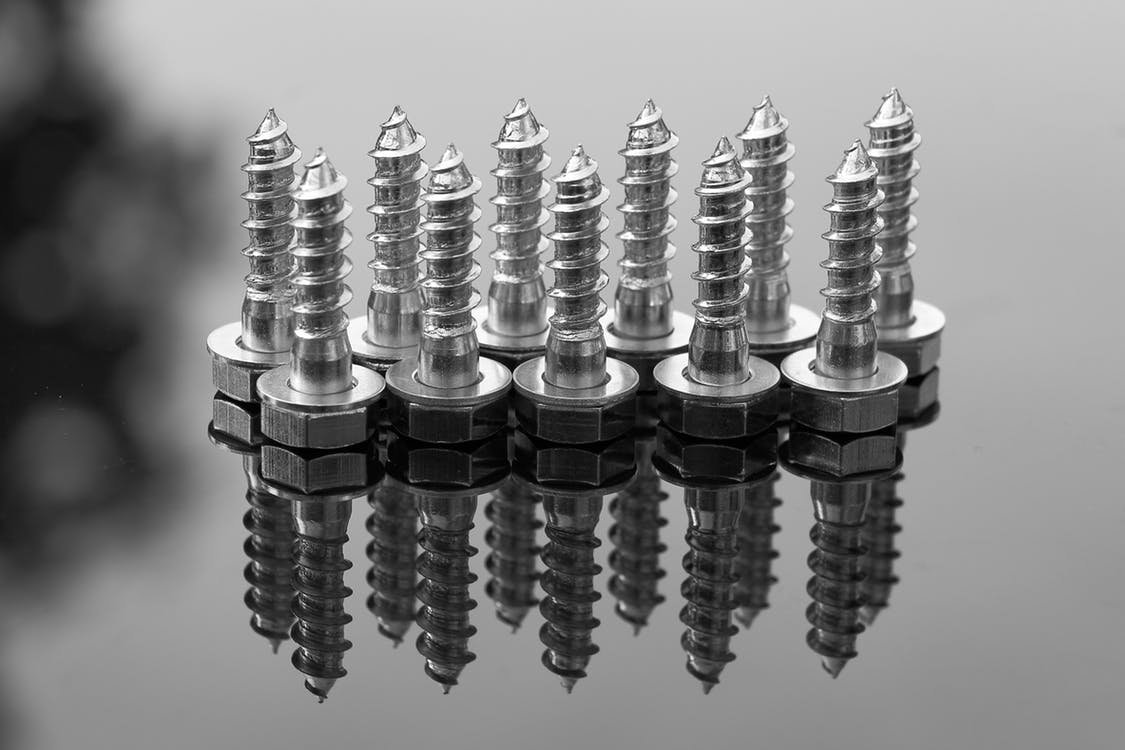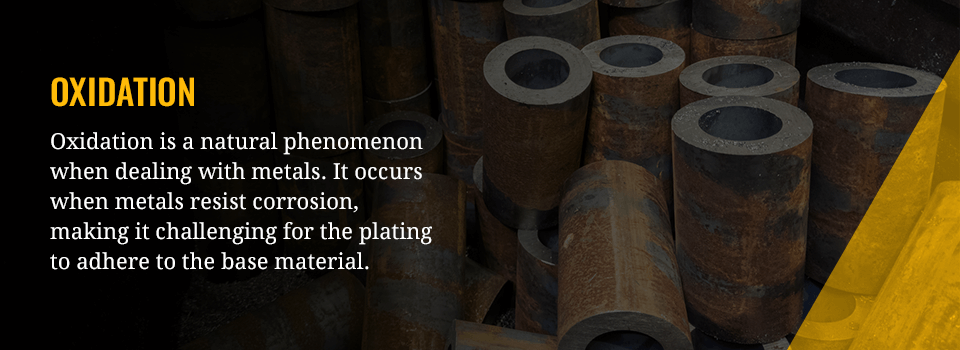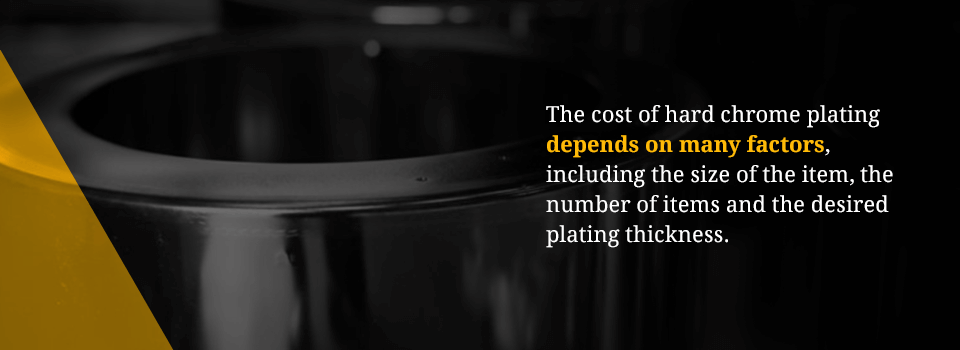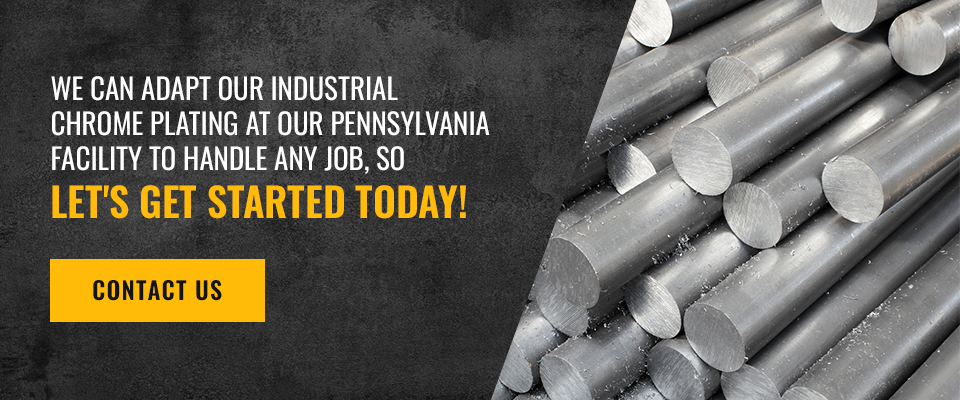Industrial Hard Chrome Plating Guide
 Chrome plating increases the hardness, durability and corrosion resistance of a surface while also creating a shiny and smooth surface that is easier to clean.
Chrome plating increases the hardness, durability and corrosion resistance of a surface while also creating a shiny and smooth surface that is easier to clean.
For improved wear and corrosion resistance, it’s tough to beat hard chrome plating. The hardness and durability of a chromium metal surface finish means your parts will last longer even under severe mechanical contact and wear situations. A chrome surface also resists corrosion, making it suitable for use in harsh environments or where other plating materials would wear away, exposing the substrate metal to corrosion attack.
Here at Hard Chrome Specialists, we’re a Pennsylvania leader in industrial surface finishing and plating and are proud of our hard chrome plating technology. Since 1988 we have been meeting the needs of customers across Pennsylvania in cities like York and Harrisburg and are equipped to take care of your industrial hard chrome needs. We have over 14,000 square feet of space in our Pennsylvania facility and can handle any job.
Explore the Rest of Our Hard Chrome Plating Guide:
How Long Does Hard Chrome Plating Last?
The longevity of hard chrome plating varies depending on the application and the environments the chrome is exposed to, but it typically extends the wear life of the base material by 2 to 10 times. The life span of any chrome plating depends on several factors:
- Surface preparation care and method
- Choice and quality of plating solution
- Thickness of the plating layer
Here at Hard Chrome Specialists, we carefully choose our plating parameters to deliver the best wear, corrosion and durability characteristics. We also take care to prep all materials and products prior to plating and maintain a clean, pure bath to eliminate impurities. The result is top-quality hard chrome plating that will give you years of reliable use. In many non-wear situations, our chrome plating can last for decades, even in harsh conditions.
How Long Does Chrome Plating Take?
The hard chrome plating process can take up to a day to complete. The duration depends on several factors, including
- The size of the items
- The number of items
- The amount of chrome needed
- The desired thickness
- Other particular specification requests
What Is the Use of Chrome Plating?
At first glance, chrome plating may appear to be a purely aesthetic finish. While chrome plating does offer an attractive and appealing finish for a wide range of products, hard chrome surfaces are also ideal for a multitude of other industrial applications, including:
- Hydraulic cylinders and pistons
- Automotive and mechanical components
- Rolls, molds, dies, screws and other forming surfaces
- Press punches and tooling
- Mining and agriculture equipment
- Shafts and rotors for pump applications
- Components used in textiles and printing
These are just a few of the common industrial applications of hard chrome plating. You can contact our team to learn more about other applications or to discuss your specific chrome plating needs.
What Is the Hard Chrome Plating Process?
Our advanced industrial chrome plating procedure makes use of an electrical current to pull dissolved metallic chromium out of our plating bath and deposit it in a thin layer on the substrate — which is your product or material. Through precise bath chemistry and current flow control, we can deposit the right thickness of chrome plating for your application. Our proven results make us one of the most trusted names in hard chrome plating on the East Coast and allows us to continue growing our customer base in Pennsylvania, Maryland and across the country.
Once the chrome layer is deposited, it provides a hard, durable surface that resists wear, impact and corrosion. You also get a clean, smooth, attractive surface that is easy to clean and inspect for abnormal wear. Some industrial chrome plating applications require a consistent and attractive finish, and our chrome plating is the perfect solution for years of reliability.
Other Hard Chrome Plating Benefits
The practical wear and corrosion advantages of hard chrome are what makes it so popular, but there are other industrial benefits of hard chrome plating that make it even more appealing:
- It can be applied to a wide range of metals, including stainless steel, copper, brass and more
- Can be applied at low temperatures, meaning little effect to the substrate metal
- Is suitable for complex and irregular geometries, including holes and bores
- Adherence is excellent, meaning little risk of de-lamination or flaking during use
When you add all of these advantages up, you’re getting a quality industrial chrome finish that reduces operating costs and minimizes downtime thanks to the improved wear resistance, hardness and corrosion response of your plated parts.
Appearance Benefits as Well
On top of the practical and empirical benefits of hard chrome, it also provides a bright and appealing finish, making it suitable for parts that will be visible or on display. An even smoother finish can be achieved by grinding and polishing, making our industrial hard chrome plating ideal for ball bearing and sliding guide applications as well.

Common Hard Chrome Problems and How to Resolve Them
While hard chrome plating has many benefits, it is usual to encounter certain challenges before and after the process is complete. Here are four of the most common problems and their solutions:
- Oxidation: Oxidation is a natural phenomenon when dealing with metals. It occurs when metals resist corrosion, making it challenging for the plating to adhere to the base material. To prevent this, apply the plating before the metal is exposed to water, moisture or wind.
- Blistering: This occurs when nitrogen and hydrogen expand inside the pores due to heat, creating bubbles on or within the platings. Blisters keep hard chrome from performing at its best. Cleaning the base metal thoroughly before applying the hard chrome curbs this problem.
- Burned deposits: This occurs when chromium deposits rapidly in high current densities, usually around the edges and ends of the material. The areas burn when the chrome builds under these circumstances. To avoid burned deposits, control the current density.
- Cleavage points: This often occurs during the die-casting stage. The materials split along the structural planes causing reduced toughness. The best way to prevent this is to control the current density during the process.
Hard Chrome FAQs
What is hard chrome plating?
Hard chrome plating is a process in which a layer of chromium is applied to a surface to improve corrosion and abrasion resistance, reduce friction and extend the life of parts used in extreme wear conditions.
How hard is hard chrome plating?
Hard chrome plating measures between 68 and 72 on the Rockwell "C" scale, which is used to determine the indentation hardness of a material. Very hard steels used in tools and quality knife blades typically measure between 55 and 66 on the same scale.
What kind of materials can be hard chrome plated?
Common materials that are hard chrome plated include steel, cast iron, stainless steel, bronze, brass and copper.
What is the difference between chrome and hard chrome?
The difference between hard chrome and decorative chrome is that hard chrome is used for wear resistance and decorative chrome is used for cosmetic purposes. For this reason, decorative chrome is usually much thinner than hard chrome.
Is hard chrome plating magnetic?
Hard chrome plating is a non-magnetic coating.
Does hard chrome rust?
Hard chrome has excellent corrosion resistance, so does it rust? Hard chrome plates in a micro-crack structure so it will rust over extended periods of time in wet environments.
Is chrome plating toxic?
Chromium is a carcinogen in its liquid state, but once the plating process is complete the plated material is completely non-toxic.
Does the quality of chrome matter?
Absolutely! It would be better not to plate the material at all than use a low-quality chrome. This is because the finishing becomes porous, exposing it to substances such as hydrogen, oxygen, electrical current or dirt. The environmental conditions such as wind, moisture and water which contain these substances cause the base material to corrode quickly.
Is there a difference between chrome and chromium?
While these words are often used interchangeably, they are actually slightly different. Chromium is an element on the periodic table, while chrome is the name given to chromium that has been plated onto another material.

How much does hard chrome plating cost?
The price could range from hundreds to thousands of dollars. The cost of hard chrome plating depends on many factors, including the size of the item, the number of items and the desired plating thickness. However, hard chrome plating costs more than other platings due to the process and labor involved, the demand and the cost of materials used.
How thick can chrome plating be applied?
Hard plating thickness generally ranges between 0.0008 to 0.0050 inches. In comparison, thin dense chrome has a thickness range between 0.0002 to 0.0006 inches. The chrome plating's thickness depends on its application.
What happens when chrome heats?
Chrome plating becomes soft when exposed to high temperatures. However, it maintains its resistance to the weather conditions which induce rust. Hard chrome increases the base material's life span.
Can you re-chrome over chrome?
It's possible to re-chrome hard chrome platings. The deposits can be removed with chemical strippers without damaging the base material. We strip away the old chrome, polish the surface to remove all defects and scratches and then re-plate the material. Re-chrome requires more preparation to achieve the desired finish.
How does our chrome plating process differ from others?
Hard Chrome Specialists uses conforming anodes to improve deposit deposition. This results in a more uniform plating of the base materials, especially in hard-to-reach areas like corners and irregular spaces.
It’s easy to see why more and more Pennsylvania industrial customers are turning to our team here at Hard Chrome Specialists for our advanced chrome plating services. Fill in our contact form or give us a call, and we'll get started studying your project and understanding the unique requirements of your products and materials. We can adapt our industrial chrome plating at our Pennsylvania facility to handle any job, so let's get started today!
Explore the Rest of Our Hard Chrome Plating Guide:

